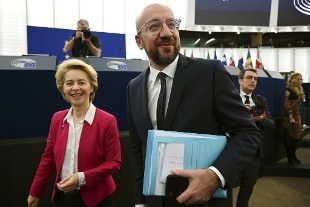- EU Budget: Michel convenes an extraordinary summit for February 20
- Stability Pact, Gentiloni: 'green' investments are needed in all states
Share
20 February 2020 The extraordinary summit convened by President Michel on the controversial issue of the Community budget is starting in Brussels. A river European Council that is likely to last until Saturday morning, with the leaders of the 27 who will try to bring home an agreement on the EU's multi-annual budget from 2021 to 2027, over one trillion euros that will be used to finance the common agricultural policy and cohesion policy for the poorest regions, but also to support the main pillars of the von der Leyen agenda, from the European Green Deal to the digital transformation of the economy to European defense policy.Gentiloni: "Without investments you don't go far"
"It doesn't work that the European budget remains of a very modest size. We ask what we call Europe, not all of us Europeans but of the institutions, to make a fundamental contribution to investment, agricultural and other policies. We are talking about a very budget limited if you want to have great ambitions. There has been generalized resistance from several countries. If there is no public investment, we will not go very far. We are re-discussing the rules. " So Paolo Gentiloni, European Commissioner for Economy, at Radio Capital.
"I hope that arrangements will be made to review the rules"
"Perhaps the summit that begins today will not produce a conclusive speech. I hope to be able to build that minimum balance to review the rules and give more space to investments," he added.
The Michel draft
The negotiation starts from the draft of the President of the EU Council, who proposed a 2021-2027 budget equal to 1.074% of GDP. European sources, on the eve, made it known that Michel, "is determined to reach an agreement in the next few days", because "without an agreement, there will be no more legal basis to spend money on some of our central policies Without an agreement there will be no programming, we are going to lose 2021 and, if we go further, we will lose 2022 ", added sources from Brussels. But the agreement must pass unanimously and the conditions of the eve are not good.
The opposing sides
The field deployments are composite: on the one hand the so-called 'frugal', that is, the Netherlands, Austria, Denmark and Sweden, which aim to reduce the budget ceiling by up to 1% and ask to cut on Agriculture and Cohesion by increasing the funding for Green Deal, Research and Defense. The four also ask that the so-called 'rebates' be reconfirmed, or the discounts enjoyed by London and which would increase their net national contribution. The 5 countries asking for discounts are Germany, Holland, Austria, Denmark and Sweden and an EU source has hinted that Michel is ready to grant them.
Italy: "Unambitious draft"
Italy, which has already defined the draft Michel as "unambitious", takes sides instead to preserve the current level of funds for Agriculture and Cohesion and opposes to preserve the "rebate" for the richer countries. According to Rome, more resources are needed to finance the new policies, from the green deal to the digital one, and Italy has asked for a larger budget not by increasing national contributions, but by opening the EU's own basket of resources that can finance European public goods.
Together with Italy also Bulgaria, Cyprus, Croatia, Estonia, Greece Latvia, Lithuania, Poland, Portugal, Malta, the Czech Republic, Romania, Slovakia, Slovenia, Spain and Hungary insist on not cutting back on agriculture and cohesion funds.
Germany supports the 'frugal' to reduce the budget ceiling to 1% and insists on linking the cohesion funds to respect for the rule of law. The latter was rejected by the Visegrad countries.
The critical European Parliament on the draft
Michel's proposal is also judged unambitious by the majority in the European Parliament, which is not part of the negotiation at this stage, but who will have the final say at the time of the assembly vote: The Eurocamera threatens to reject a budget well below his expectations and the president himself, David Sassoli, reiterated today that Michl's proposal is not admissible: "At the moment we are sharing 230 billion", Sassoli repeated.
The summit will open in the afternoon with the plenary session and an initial exchange of views between the leaders on the draft Michel: the most imaginable scenario is that heads of state and government will reaffirm positions and divergences. At that point it will be Michel's task to summon the leaders one by one in a series of bilateral talks to try to find a square by the weekend.

